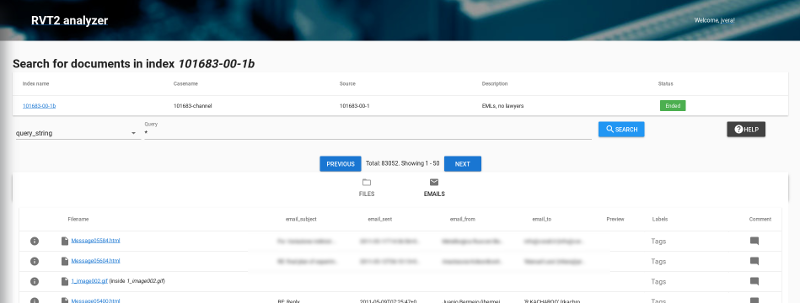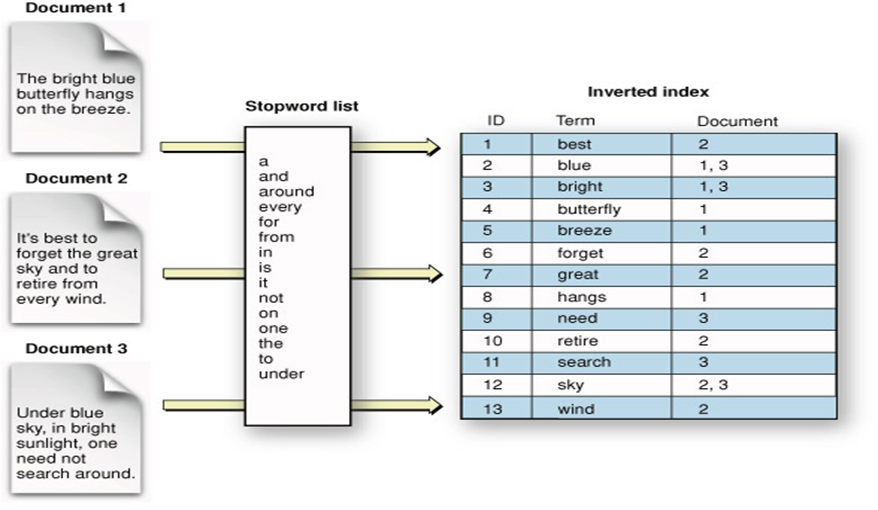# User manual
RVT2's analyzer provides a web interface to perform forensic analysis on sources previously indexed in an ElasticSearch server. Using RVT2's analyzer, an analyst can run complex queries on document content and metadata, and tag or comment documents.
If you don't have access to an already created RVT2 analyzer, download it from: https://github.com/IncideDigital/rvt2-analyzer (opens new window)

The analyzer is compatible with all modern browsers: Google Chrome, Mozilla Firefox, Microsoft Edge and Safari 10+. It is not compatible with Internet Explorer or Safari 9 and older.
Table of contents:
# What does and what doesn't an indexer do?
WARNING
This section introduces indexers and ElasticSearch. Many analysts are used to grep to look for keywords within documents. Indexers work in a very different way. You must read this section very carefully and navigate the provided links to prevent false negatives.
RVT2 analyzer searches for content indexed in ElasticSearch, which uses search engine indexing. You can find a good introduction to the topic at https://en.wikipedia.org/wiki/Search_engine_indexing (opens new window).
The RVT2 indexer plugin parses documents in a source, extracts the content and metadata in these documents, and indexes the output into ElasticSearch. Many different options can be configured, for example, to specify the exact metadata to index or the content language. The default options must be enough for most cases.
# Content
The content of a document is parsed using Tika, analyzed using Elastic's standard analyzer (opens new window) and indexed as text. This means:
- You can only search for files supported by Tika (opens new window).
- Content will be converted to lowercase text and tokenized using some punctuation signs as separators.
- Punctuation signs are not indexed.
- Language analyzers are optional and they are not used in the default RVT2 configuration. As a consequence, using the default configuration:
- Stopwords (common words in a language) are also indexed.
- Verbs and nouns are not normalized: singular terms won't match plural terms.
- In some query types, you can try adding
*to the end of the term.
- The RVT2 indexer supports several query types as defined by ElasticSearch. Currently:
match,simple_queryandquery_string. See below.

WARNING
Documents and queries are parsed to text, tokenized, indexed and (depending on the query type) fuzzy searched. All in all, you are not running a grep on actual documents or their content! ElasticSearch will take a best effort approach while running queries, but there is not a guarantee that you'll get all documents matching a query.
If you really need a grep, use other RVT2 plugins such as search.
These are some examples for text fields:
- The content
The 2 QUICK Brown-Foxes jumped over the lazy dog's bone.will be tokenized and indexed as[ the, 2, quick, brown, foxes, jumped, over, the, lazy, dog's, bone ]- Notice these queries won't match this content because the query terms are not present in the tokenized content:
fox,dog. However,fox*anddog*might match the content.
- Notice these queries won't match this content because the query terms are not present in the tokenized content:
- The content
johny@someserver.comis tokenized and indexed as[johny, someserver.com].- These queries will match:
- match query type:
johny@someserver.com,johny someserver.com,someserver.com,"someserver.com johny"(match type interpretes sentences as simple OR terms) - query_string query type:
johny@someserver.com,johny someserver.com,someserver.com,someserver*,someserver?com,someserver.com johny,johny@sameserver.com(notice thea)
- match query type:
- These queries won't match because the query terms are not present in the tokenized document:
- match type:
someserver,johny@someserver(someserver.comis indexed,someserveris not),someserver*(match type does not support wildcards) - query_string query type:
someserver,johny@someserver*,"someserver.com johny"(this is a sentence in the wrong order)
- match type:
- These queries will match:
http://world.com/hellois tokenized and indexed as[http, world.com, hello].
# Metadata
Documents are parsed using Tika, and their metadata fields are mapped according to the map
in the tika-mapping.cfg configuration file. These fields are parsed using both Elastic's standard
analyzer and keyword analyzer (opens new window),
and most od them are indexed both as an analyzed text (field content_type, for example)
and raw keyword text (field content_type.keyword, for example).
The specific fields can be configured specifically for each case. Nevertheless, we try using these fields in all cases:
- embedded_path: If a document is inside another, this is the path of the document inside the root document. Roots documents do not have an embedded_path. For example:
- If the document is an image inside a zip, the embedded_path is the path of the image according to the zip file.
- If the document is an attachment to an email, the embedded_path is the name of the attachment.
- path: The path the to root document, relative to the case directory. This is the path of the zip file or the email file in the examples above.
- filename: The filename of the root document.
- extension: The extension of the root document. Keep in mind a user can change the extension of any file.
- content_type: The content type of the document, according to the parser Tika.
- content: The content of the document, if any,
- author: The author of the document according to the metadata, if any.
- last_modified: When the document was modified according to its metadata (not the filesystem), if any.
- comment: A comment from an analyst.
- tags: A list of tags for this document.
- analyst: The name of the analyst that commented or tagged a document.
- blindsearches: If present, the document is a result of these searches.
# Logging into the system
When an analyst first enters the system, an analyst enters his/her name and the URL to the ElasticSearch server that indexes the documents.
- The analyst name is used to mark the last analyst that commented or tagged a document. This way, if a different analyst explores the same case and does not understand why a document is tagged as important, the original analyst can be contacted.
- There may be different ElastiSearch servers for different cases in the network.
After entering a name and an ElasticSearch URL, a list of indices stored in the server is provided. Select the index you are interested in and start your analysis.
# Tags and comments
Analysts can use arbitrary text to tag documents. Some tags are classified by color to assist during visual inspections:
- Red color:
importantandrelevant. Use these tags for documents of importance to the objectives of the investigation process. - Yellow color:
warningandcheck. Use thses tags to indicate another analyst to check your findings. - Green color:
seenandirrelevant. Use these tags to mark a document as not important or already seen.
TIP
Tagging a document as important and seen, for example, might make sense.
WARNING
Tags should have only lower case letters. Do not use special characters or spaces.
Comments are plain text and they don't have any special syntax, but the use of Markdown is encouraged.
TIP
The name of the last analyst that edited tags or comments is stored in the analyst field.
# Query Types
Currently, the RVT2's analyzer provides templates for three different query types: query string, simple query and matches. This types of query are described in depth in the ElasticSearch documentation. Next, we provide some examples of its usage.
# Query String
Query string queries use Lucene's syntax (opens new window). By default, all fields are searched.
*returns all documents. Useful to know the size of the index.dog catis equivalent todog OR cat. This query searches for documents including either dog or cat (both terms).dog cat^2searches for documents including any of these terms, but considers cat twice more relevant when sorting results.dog AND catsearches for documents including both dog and cat.dog NOT catsearches for documents including dog but not cat.(dog OR cat) AND mouseis an example of a complex query.ni?omatches niño as well as nino.nina~matches words similar to nina, such as niña or mina."computer virus"~5searches for computer and virus separated by, at most, 5 other words.extension:.pdf AND path:*dog*search for documents with extension .pdf and the word dog in its path (either folder or filename).last_modified:[2016-01-01 TO 2017-12-31]searches for documents modified between January, 1st 2016 and December, 31st 2017.tags:importantsearches for documents tagged as important
# Simple queries
Simple queries use a simplified syntax (opens new window). By default, all fields are searched.
*returns all documents. Useful to know the size of the index.dog catis equivalent todog | cat. This query searches for documents including either dog or cat (both terms).dog | cat^2searches for documents including any of these terms, but considers cat twice more relevant when sorting results.dog + catsearches for documents including both dog and cat.dog + -catsearches for documents including dog but not cat.(dog | cat) + mouseis an example of a complex query.ni?omatches niño as well as nino.nina~matches words similar to nina, such as niña or mina."computer virus"~5searches for computer and virus separated by, at most, 5 other words.
# Matches
Matches are simple queries that search only in the content field. The text is searched AS IT IS, without any special syntax.
Check the match query (opens new window) in the ElasticSearch documentation.
# Administration
Admins can edit or delete the job information. To enter the admin console, add admin to the URL.
← Examples Installation →